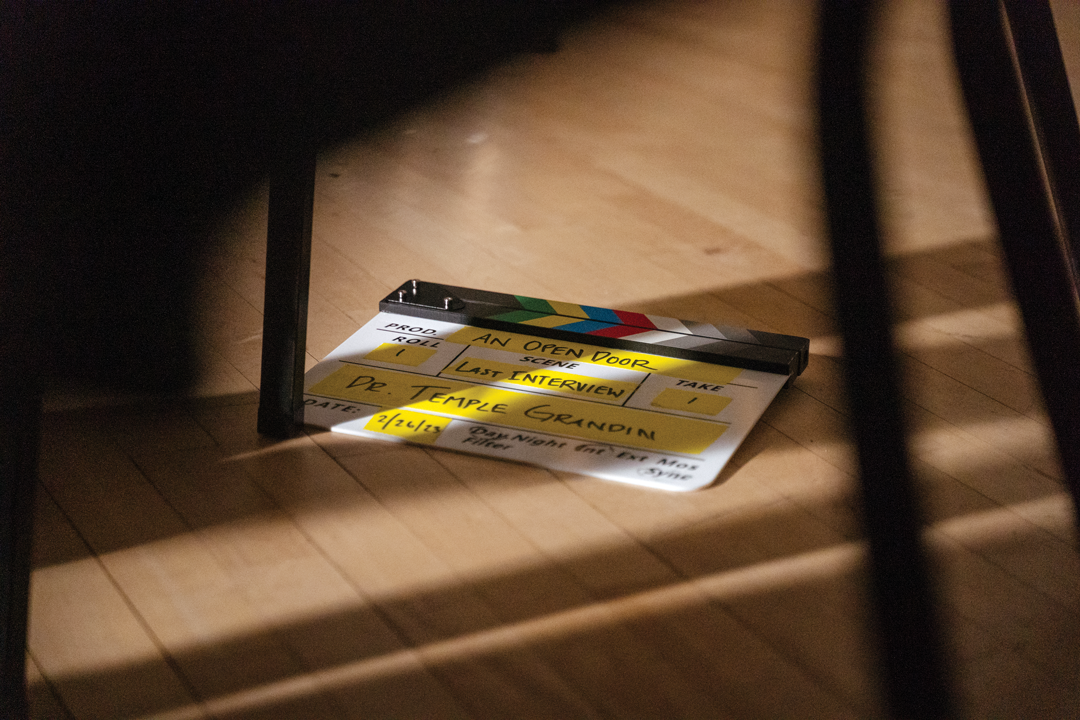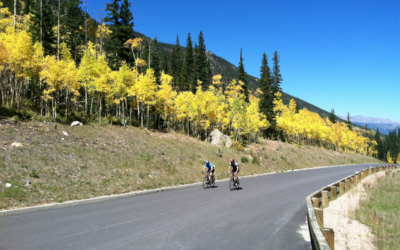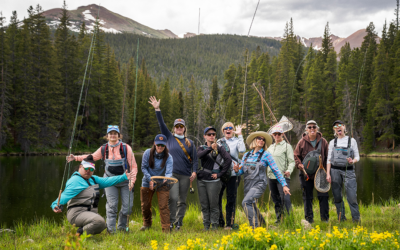Temple Grandin was telling a story to a guest about how she was shunned as a child, and John Barnhardt was half listening, only because he’d spent a lot of time with her in the last few months. The story was important but familiar.
Then she jolted him out of his thoughts.
“This can happen to people with autism,” Grandin said before turning to Barnhardt. “Right?”
This wasn’t the first time Grandin had diagnosed him as autistic. He can laugh about it now, especially since the documentary he shot honoring her legacy is wrapped up and ready for appearances at film festivals. And because he knows Grandin so well, he knows one more thing: She meant it as a compliment.
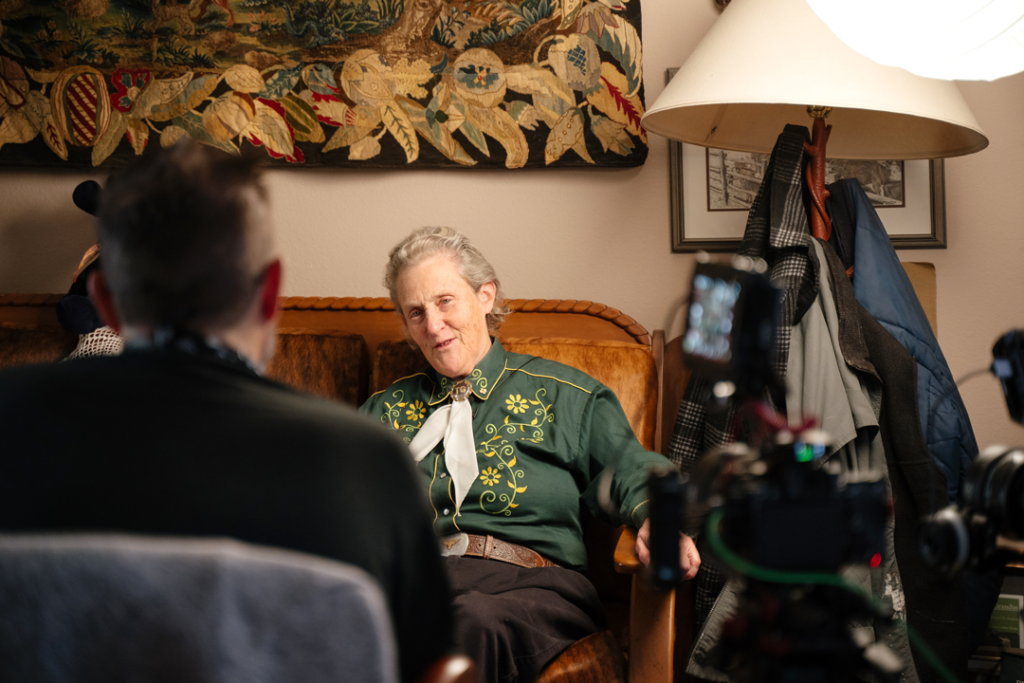
Temple Grandin – Photos courtesy of John Barnhardt with Barnfly Productions.
“John did a beautiful job,” Grandin said in an interview where she, again, repeated her diagnosis of him. “He is a visual thinker.”
Grandin loves “An Open Door,” a new documentary on her, presented by Colorado State University. Grandin is a professor there and has a building named after her.
CSU created the documentary to showcase her teaching. Grandin is, of course, a legend, both for her advancements in the livestock industry and her advocacy for autistic people like herself. Most people know her rise from being a misunderstood autistic student to a world-renowned innovator that made keeping livestock more humane, less dangerous and more profitable. But not many know her for her teaching.
Grandin appreciates the documentary for the same reason. She spent a good chunk of her life looking out for students who remind her of herself. She is a visual thinker, a common trait of those with autism, and while it’s served her well, it’s a trait that can make certain subjects, like algebra, difficult. Many were willing to give up on her as a result, but her mother, and a few teachers, saved her. Grandin believes it’s her responsibility to help those who were once like her to ensure they aren’t shunned.
Barnhardt agrees that he is a visual thinker, like Grandin. He is not autistic. But her looking out for him is a reason why he’s so compelled to work essentially as a solo director (with a little help from film students) to spread the word about her teaching and continued advocacy for autistic students—or anyone else who may not fit society’s expectations but still has a lot to offer. Barnhardt’s connection to the university as an alum was another reason.
A new story
HBO presented a movie about Grandin’s life back in 2010, and Claire Danes played her so well that she won many awards as well as the admiration of Grandin, who simply said “she became me.” The movie focused on the first half of Grandin’s life and her brilliant advancements in the livestock industry, as well as her struggles as a child.
However, it occurred to John Festervand that there was so much more to share after becoming friends with her.
Festervand is the director of development for the College of Agricultural Sciences at CSU. As he watched Grandin connect with students, he knew he wanted to present the side of her that the public didn’t know: the researcher, the teacher and, most importantly, the advocate for so many who’ve been overlooked. Someone, he thought, who is driven to open doors for others. She almost can’t help herself, as demonstrated by her looking out for Barnhardt.
Grandin saw Barnhardt, the director and visual thinker, as yet another example of someone who overcame society’s strict standards and made it. She sees herself that way as well, which is why she loves “An Open Door.” It shows her as an advocate and a teacher, not just someone who has hurdled obstacles.
Now that Grandin is 75 years old, people are recognizing her for the work she’s done. Aside from the documentary, CSU gave her the university’s top honor, the Founders Day Medal, and named its equestrian center after her.
We tend to do this for legends in their sunset years, only Barnhardt and Festervand don’t see it that way.
“The underlying theme is she was shunned, and so none of this would have happened. And yet, people are still shunned,” Festervand says. “All she’s done has led her to this idea that there’s different minds and we can’t shun any of them. And now, finally, you see her opening doors for other people. She’s more relevant than ever.”
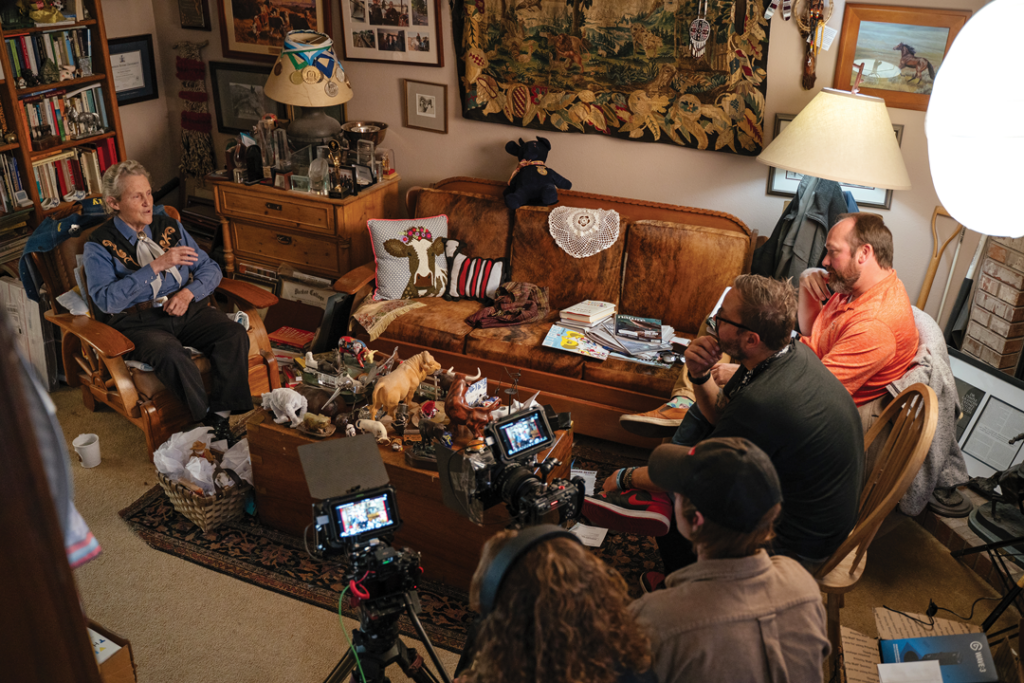
A responsibility
It’s hard to know how much all the accolades and attention mean to Grandin. She has friends and people she admires, respects and mentors, but her disability means she measures human connection in a different way.
Yet she accepts the admiration, and she’s pleased by it: “I treat it all like a responsibility. A lot of kids look up to me.”
Before long, however, she shifts her focus to why education and teaching are so important, something those honors highlight.
“Teaching doesn’t get enough credit,” she says. “It’s something I take very seriously.”
Teachers like her, and their parents (Grandin frequently credits her mother for advocating for her early on), are the only way more kids won’t get shunned, she says. For example, students who can’t do algebra, a subject Grandin criticizes, may fall behind because they learn like her instead of how society requires them to learn. Autistic students may wind up languishing in programs that don’t recognize their strengths and focus on what they can’t do instead of what they can.
“I’m happy that people are recognizing me,” Grandin says. “But I have to continue to push.”
Missing the point
The new documentary does get into her childhood and her time innovating within the agriculture industry, but even then, Grandin leads viewers through it as they watch—a major advantage of the documentary over HBO’s drama.
One other film, “Stairway to Heaven,” was made about Grandin, which was created by director Errol Morris. Morris is a terrific documentary filmmaker who won an Academy Award for “The Fog of War,” Barnhardt says, but he got Grandin wrong.
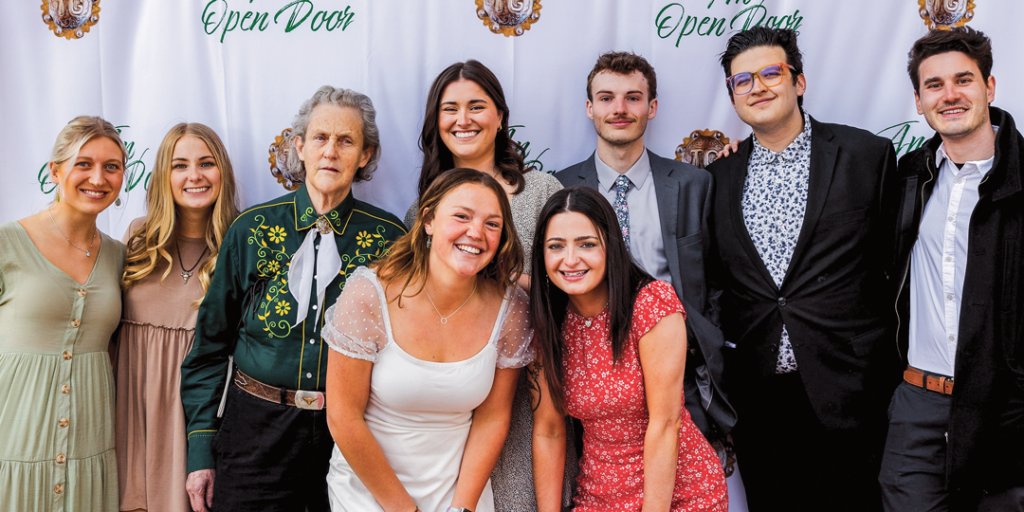
Back row: Melanie Chaffey, Samantha Demers, Temple Grandin, Rachel Mild, Tyler Naretto, Jacob Faulkner, Lyubo Kraev. Front row: Ella Peters, Emmanuelle Abel.
“That one made her seem like this frantic, scattered person who happens to be good at something,” he says. “She’s not that. He missed the point on who she really is.”
Barnhardt and Festervand are proud of the new documentary and will ship it to film festivals across the country in the hopes that someone picks it up for distribution, which is what will give the general public a chance to see it. The movie is in limited screenings to keep it fresh for film festivals before, both hope, it’s released to the general public through a distribution deal.
In fairness to Morris, Barnhardt says now is a much better time to do a documentary: “She has a better retrospective of her life at this point.”
In fact, Barnhardt learned many things from Grandin while making the film about her—not just that he’s a visual learner. His biggest takeaway was watching Grandin come to life when she taught.
“When you turn this age, you aren’t done,” he says. “She’s just coming into her own right now. It’s how you finish that matters.”


